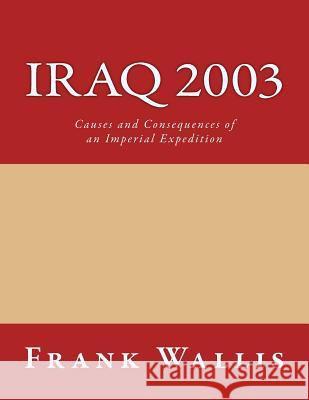Iraq 2003: Causes and Consequences of an Imperial Expedition » książka
Iraq 2003: Causes and Consequences of an Imperial Expedition
ISBN-13: 9781517764869 / Angielski / Miękka / 2015 / 386 str.
Well researched, generously footnoted, with a large bibliography, this is a work of scholarship intended for the well-informed specialist and anyone who likes to discover cause and effect in history, instead of slogans from politicians and talk-radio.
The US invasion of Iraq in 2003 is best understood as a problem of instability on the American imperial periphery, solved through military power, rationalized by energy policy. The cause of invasion was material (oil in the Persian Gulf), the ideology couched in terms of national security (WMD and Muslim terrorism), based on the belief in American exceptionalism, which resulted in predictable consequences for people living in Iraq (death, destruction, and exploitation), who were either coerced or bribed for the purpose of establishing a collaboration with the United States. Empires are violent, and those who resist collaboration are usually punished: Iraq was no exception.
The approach of this book is to accept a holistic interpretation of human behavior. When explaining empire and imperialism some writers assume that actors (people) and agency are at the root of causality, while others assume that structure and system are the overriding factors in history. On the question of the Iraq expedition in 2003 it is most useful to consider both of these general trends in scholarly approach. For example, George W. Bush made a set of critical decisions in the period before 2003, establishing an agenda, delegating responsibilities, and executing policy based on secret intelligence assessments that were customized to fit the president's prejudices. That was human agency at work. But Bush also operated within a structure of power relationships in the US, founded on corporate interests and therefore economic in nature, focused in Washington at the core of the empire through members of Congress and oil industry lobbyists.
The causes and consequences of the Iraq expedition must be set within the imperial context. The US had an obsession with stability in the Persian Gulf since World War II, but post-9-11 there was a greater concern over Muslim terrorism, coupled with manipulation of the fear of the proliferation of weapons of mass destruction (WMD). Corporatist objectives included the securing of stable petroleum markets and profiting from easily extracted, effortlessly transported, and cheaply marketed gasoline for the American transport sector. The consequences of the imperial expedition to Iraq in 2003 must include 1.) the dual falsehoods of imminent WMD threats from Iraq and Muslim terrorism sponsored by Saddam Hussein, a secular dictator, 2.) the occupation and direct rule of Iraq under the Coalition Provisional Authority, 3.) human rights abuses, and 4.) the punishment campaign against Fallujah.
The conclusion amplifies the most significant ideas about empire and imperialism as they relate to Iraq 2003. These include the persistence of the ancient Roman concept of "dominus totius orbis" (Lord of the World), and the associated idea of forced conversion of barbarians, the evolving notion of civilizing mission, formal and informal empires, rationales or myths of imperial aggression, overextension, elite perception of vulnerability, strategic culture, American empire as a way of life, corporatism, the petroleum interest, rationality and irrationality in policy decisions, collaboration, leadership masculinity cults, human rights and democracy, and national security.
Zawartość książki może nie spełniać oczekiwań – reklamacje nie obejmują treści, która mogła nie być redakcyjnie ani merytorycznie opracowana.











